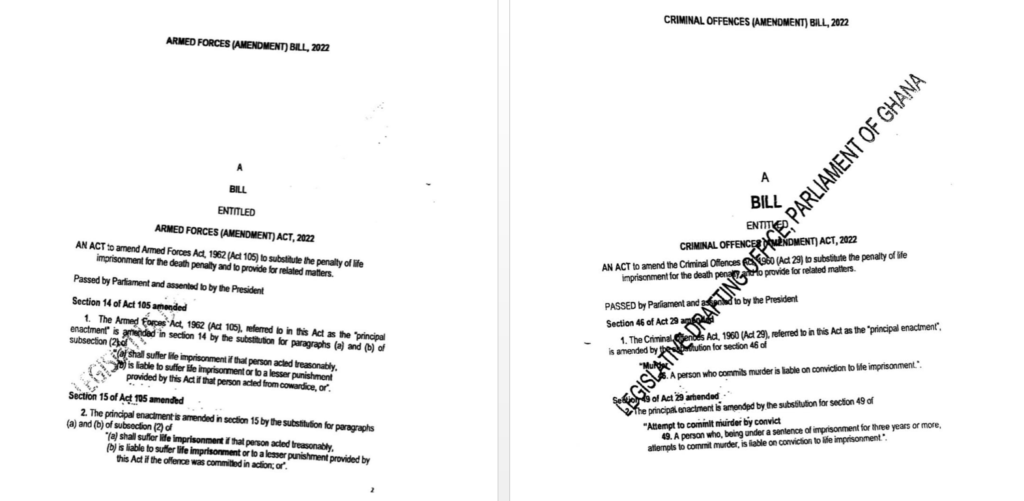The Criminal and Other Offences (Amendment) Act 1960 Act 29 and Armed Forces (Amendment) Act 1962 Act 105, commonly referred to as the Death Penalty Bills introduced by the Member of Parliament for Madina Constituency, Francis-Xavier Sosu, have been gazetted.
The Bills which seek to amend sections 46, 49, 49a, 180, 194 and 317a of the Criminal and Other Offences Act, 1960 (Act 29) and sections 14,15, 16, 17, 19, 20, 40, 78, and 79 of the Armed Forces Act 1962, (Act 105) to give effect to the recommendations of the 2010 Constitutional Review Commission and Government White Paper on the abolition of Death Penalty was gazetted on Tuesday, June 28, 2022.
It would be recalled that Amnesty International’s Global Report for the year 2021 in discussing notable country developments in Ghana stated “a Private Member’s Bill, proposed to Ghana’s Parliament in June by Francis-Xavier Sosu, the Member of Parliament for Madina, provides for the abolition of the death penalty, as a first step, from the country’s Criminal and Other Offences Act.

At the end of the year, the proposed Bill was being prepared for a first reading, with discussions ongoing on expanding it to cover provisions in the Armed Forces Act that impose the death penalty.”
Latest statistics in Ghana show that there are about 165 convicted persons currently under sentence of death as at the end of 2021, six of whom are foreigners and comprising 159 men and six women.
According to Amnesty International, the resort to the death penalty by a minority of states was on the rise, with increase in global executions by 20 percent on the 2020 figure (from at least 483 to at least 579), while the number of known death sentences increased by almost 40 percent (from at least 1,477 in 2020 to at least 2,052 in 2021).
According to Hon. Francis-Xavier Sosu, “the death penalty being part of our laws inflicts not only immerse psychological pain and torture on accused persons and assassination officers, but also smacks of practices of backward societies.
In view of this, it is worth pointing out that Ghana has not applied the death penalty since 1993. There is therefore the need to amend sections 46, 49, 49A, 180, 194 and 317A of the Criminal and Other Offences Act, 1960, (Act 29). We must as a country take steps to expunge the death clause from our laws.”
In 2011, delivering judgement in the supreme court case of Dexter Johnson v, the Republic [20111 2 SCGLR 601@P702, the Court through Justice Dotse JSC said “l am however of the view … the time has possibly come for the Parliament of Ghana to seriously consider whether to have a policy shift in the mandatory death penalty regime imposed on those convicted of murder. It is only Parliament which can consider an amendment of the Criminal and other Offences Act, 1960, Act 29.”
In December 2020, the plenary session of the United Nations General Assembly (UNGA) saw a record number of states (123) supporting the adoption of its biennial resolution calling for the establishment of a moratorium on executions with a view to fully abolishing the death penalty — an increase of 19 votes compared to 2007, when the first UNGA resolution on this issue was adopted.
Ghana would achieve at least 95 percent abolishing of the death penalty and become the 25th African country to do so following neighbours including; Sierra Leone, Central Africa Republic, Guinea, Benin, Cote d’Ivoire, Senegal, Togo and Chad, among others, if the Private Member’s Bill initiated by Mr. Sosu is passed.
The Bills are expected to be read for the first time on the floor of Parliament and referred to the appropriate Committee before Parliament rises from the second sitting of the second session on Thursday, July 28, 2022.





